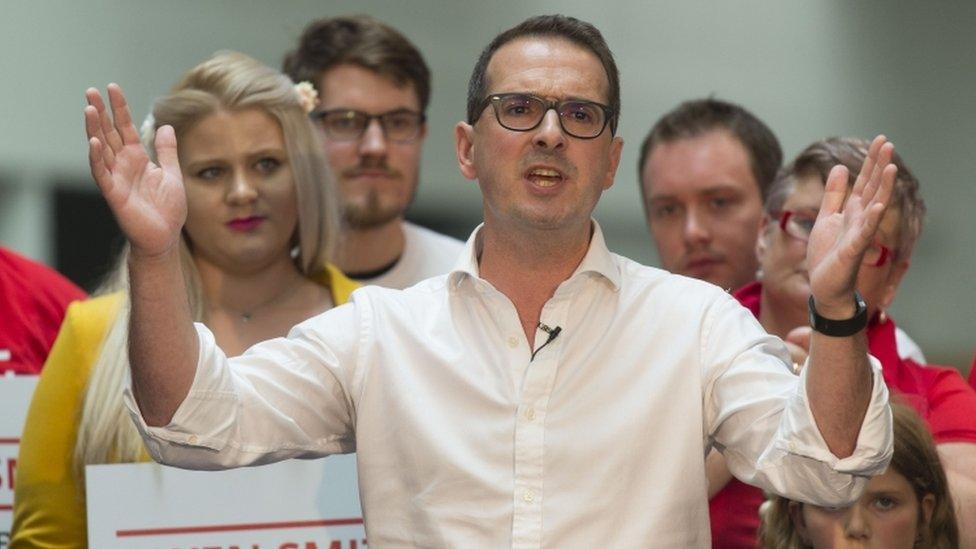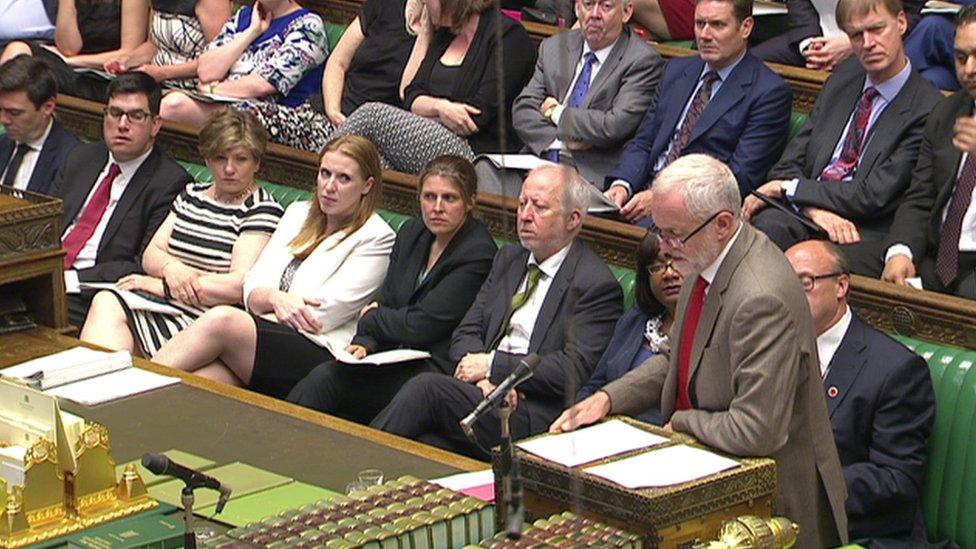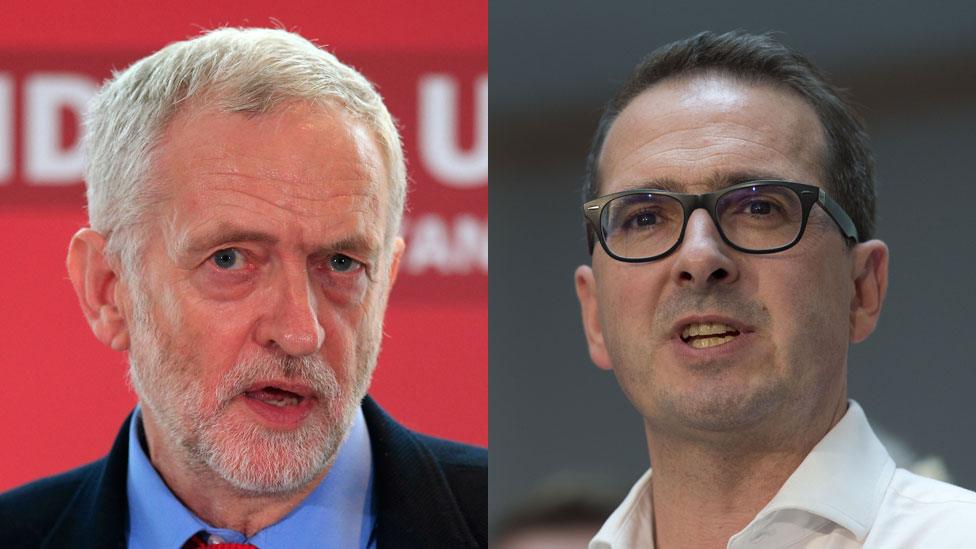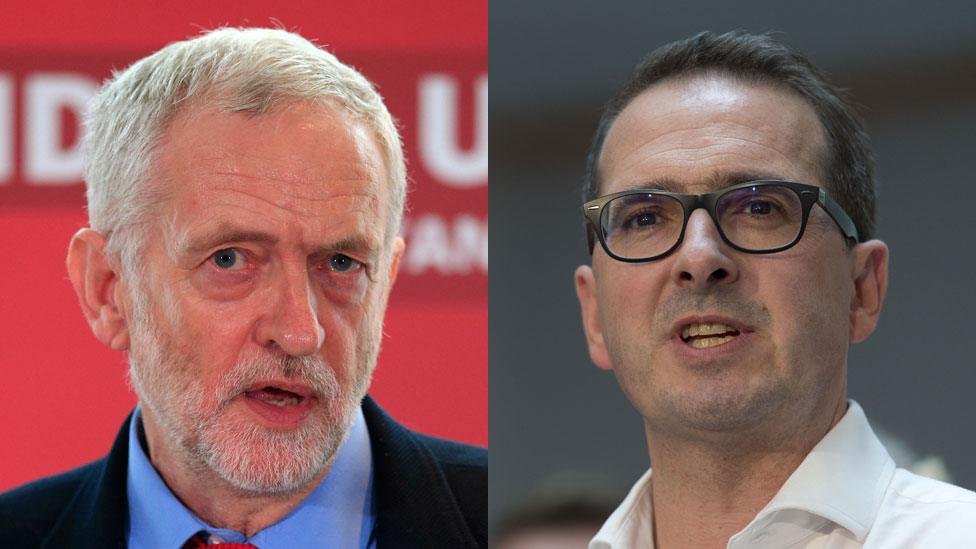Jeremy Corbyn tells Labour MPs to get behind the party
- Published
Jeremy Corbyn says Labour MPs must "get behind the party"
Jeremy Corbyn has urged Labour MPs to "get behind the party" as he launched his campaign to be re-elected leader.
Mr Corbyn promised to tackle inequality, neglect and prejudice if elected PM including plans to make companies publish equality pay audits.
He also said there would be a "full and open selection process" to choose every would-be Labour MP if new constituency boundaries were in place before 2020.
He said current MPs would be able to "put their name forward".
In the past 48 hours, 183,000 people have signed up to vote in the ballot which pits Mr Corbyn against Owen Smith.
They paid £25 each to become registered supporters by Wednesday's deadline, enabling them to have a say in the contest, with the result due to be announced on 24 September.
In his speech launching his campaign for re-election, Mr Corbyn vowed to tackle the "five ills of 21st Century Britain" - inequality, neglect, prejudice, insecurity and discrimination.
Drawing inspiration from the 1942 Beveridge report - which identified "five giant evils" and is widely regarded as being the foundation of the post-war welfare state - Mr Corbyn committed to coming up with regular detailed policies to tackle the obstacles "holding individuals and communities back".

Owen Smith has promised to be "just as radical" as the current Labour leader
Signalling his commitment to tackle workplace discrimination, Mr Corbyn said that if he became prime minister, all firms employing more than 21 staff would have to publish information about the pay, hours and grade of every job.
This, he said, would highlight the extent to which female, disabled and BME workers remained unfairly treated 40 years on from the Equal Pay Act.
Under the plan, employers could be fined for not providing the information while the Equalities and Human Rights Commission would be given a beefed-up role to monitor their compliance.
Jeremy Corbyn: All Labour MPs to face reselection process
Despite his lack of support from the parliamentary party, Mr Corbyn said Labour was "stronger" than when he took over as leader, claiming it had forced the government to abandon its austerity strategy and "changed the debate" on welfare.
He promised to "hold out the hand of friendship" to MPs after the leadership contest is over, adding: "I have an ability to conveniently forget some of the unpleasant things that are said, because it is simply not worth it."
Following an earlier attack by shadow health secretary Diane Abbott, Mr Corbyn also took a swipe at Mr Smith over his previous job working for pharmaceutical giant Pfizer.
He did not mention the former shadow work and pensions secretary in his speech, but was asked about Ms Abbott's comments in the Q&A, saying medical research should not be "farmed out" to such companies and that he hoped his rival would "come fully on board" with him over the need for an NHS free at the point of use.
Mr Smith has said he will be "just as radical" as Mr Corbyn but is better placed, with the support of the majority of his colleagues, to put principles into practice and get Labour back into a position of being ready to get back in power.
Diane Abbott says Owen Smith's past as a "lobbyist" will put off Labour Party members
Although most Labour MPs want the veteran Labour left-winger and serial rebel during the New Labour years to stand aside - and never supported him as a leader in the first place - Mr Corbyn was the overwhelming choice for leader from the party's wider membership last year.
He is still believed to be supported by Labour members and registered supporters - and some MPs who have criticised the leader fear the government's planned boundary review, due to be published in 2018 and reduce the number of MPs from 650 to 600, could be used to replace them with Corbyn supporters.
Shadow chancellor John McDonnell has previously said there was "no way" the review would be used to allow the new wave of Corbyn-supporting Labour members to deselect MPs.
But taking questions after his launch, Mr Corbyn said that if the next general election takes place on the revised boundaries: "There would be a full selection process in every constituency but the sitting MP... would have an opportunity to put their name forward.
"So there will be a full and open selection process for every constituency Labour Party through the whole of the UK."
Mr Corbyn's critics said this amounted to a deselection threat - but the leader's team said he had simply been setting out existing rules on selection.
However, the current rules state that selections following boundary changes are only open to sitting MPs.
Speaking afterwards, Mr Corbyn said the National Executive Committee was in charge of decisions about candidate selection, and that sitting MPs would be "automatically included in the short list for selection".
Mr Smith accused him of "threatening to sack" MPs with his comments.
"It's not much of an employer that says, you know, work for me and work harder or I'm going to sack you all - which is effectively what he's doing today," he told the BBC.

Who can vote in Labour leadership contest?
Labour Party members, affiliated trade union supporters and so-called registered supporters are able to vote, although there are some key differences from the 2015 contest which Jeremy Corbyn won.
Labour Party members need to have signed up on or before 12 January to be eligible to vote. Nearly 130,000 people have become members alone since the EU referendum. They will not be able to vote unless they also pay to become a registered supporter.
People could register as supporters - giving them a one-off vote - by paying £25 and stating they "share" Labour's aims and values. The two-day window for people to sign up was between 17:00 BST on 18 and 17:00 BST on 20 July
Affiliated trade union or socialist society supporters can sign up for less than £25, with rates depending on the organisation they belong to, but they have to have joined an affiliated organisation before 12 January, and then need to register before 8 August

- Published21 July 2016

- Published21 July 2016

- Published21 September 2016

- Published20 July 2016
